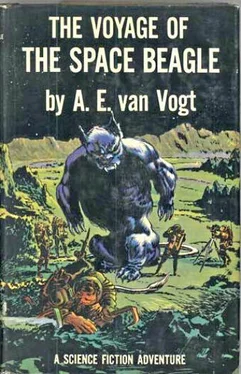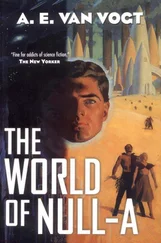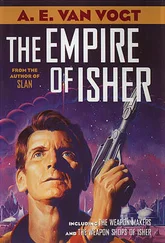Lester hesitated, then replied slowly. “The scale of magnitude is fantastic. I don’t think we should assume galactic scope yet. This barrage may be coming on a beam which is concentrated on our ship.”
Kent turned toward the men who sat in tiers of cushioned seats facing the broad and colourful control panel. He said, “Has anyone a suggestion or a thought?”
Grosvenor glanced around, hoping that the unidentified man who had spoken earlier would explain himself. But whoever it was remained silent.
Undeniably, the men no longer felt so free to speak up as they had under the leadership of Morton. One way or another, Kent had made it rather plain that he deemed the opinions of those other than department heads impertinent. It was also evident that he personally declined to regard Nexialism as a legitimate department. For several months, he and Grosvenor had been polite to each other on a basis of minimum contact. During that time, the Acting Director had, by way of consolidating his position, introduced several motions in the council giving his office more authority in certain activities, the ostensible reason being to avoid duplication of effort.
The importance to this ship’s morale of encouraging individual initiative, even at the cost of some efficiency, was a point that could have been demonstrated only to another Nexialist, Grosvenor felt sure. He had not bothered to protest. And so a few more slight restrictions had been imposed on the already dangerously regimented and confined shipload of human beings.
From the rear of the control room, Smith was the first to answer Kent’s request for suggestions. The angular and bony biologist said dryly, “I notice Mr. Grosvenor is twisting about in his chair. Can it be that he is politely waiting for the older men to have their say? Mr. Grosvenor what’s on your mind?”
Grosvenor waited until the faint wave of laughter — in which Kent did not join in — had died away. Then he said, “A few minutes ago, someone suggested that we turn around and go home. I’d like whoever did so to give his reasons.”
There was no reply. Grosvenor saw that Kent was frowning. It did seem strange that there was anyone aboard unwilling to acknowledge an opinion, however briefly held, however quickly discarded. Other men were glancing about in astonishment.
It was the sad-faced Smith who said finally, “When was that statement uttered? I don’t recall hearing it.”
“Nor I!” echoed half a dozen voices.
Kent’s eyes were gleaming. It seemed to Grosvenor that he moved into the discussion like a man anticipating personal victory. He said, “Let me get this straight. There was such a statement, or there wasn’t. Who else heard it? Raise hands.”
Not a single hand went up. Kent’s voice was subtly malicious as he said, “Mr. Grosvenor, what exactly did you hear?”
Grosvenor said slowly, “As I remember them, the words were: ‘This is an opinion. The ship should go home.’” He paused. When there was no comment, he went on. “It seems clear that the words themselves came as the result of stimulation of the auditory centres of my brain. Something out there feels strongly that it wants us to go home, and I sensed it.” He shrugged. “I do not, of course, offer this as a positive analysis.”
Kent said stiffly, “The rest of us, Mr. Grosvenor, are still trying to understand why you should have heard this request, and no one else.”
Once again Grosvenor ignored the tone in which the words were spoken, as he replied earnestly, “I’ve been considering that for the past few seconds, I can’t help but remember that during the Riim incident my brain was subjected to sustained stimulation. It is possible that I am now more sensitive to such communication.” It struck him that his special sensitivity could also explain why he had been able to receive the whisper in his shielded rooms.
Grosvenor was not surprised at Kent’s slight frown. The chemist had shown that he preferred not to think about the bird people and what they had done to the minds of the members of the expedition. Now Kent said acidly, “I had the privilege of listening to a transcription of your account of the episode. If I recall correctly, you stated that the reason for your victory was that these Riim beings did not realize that it was difficult for a member of one race to control the nervous system of a member of an alien life form. How then do you explain that whatever is out there” — he waved in the direction the ship was heading — “reached into your mind and stimulated with pinpoint accuracy those areas in your brain that produced exactly the warning words you have just repeated to us?”
It seemed to Grosvenor that Kent’s tone, his choice of words, and his attitude of satisfaction all seemed unpleasantly personal. Grosvenor said pointedly, “Director, whoever stimulated my brain could be aware of the problem presented by an alien nervous system. We don’t have to assume that it can speak our language. Besides, its solution of the problem was a partial one, because I’m the only person who responded to the stimulation. My feeling is that we should not at the moment discuss how I received it, but why, and what are we going to do about it.”
Chief geologist McCann cleared his throat and said, “Grosvenor is right. I think, gentlemen, we had better face the fact that we have entered somebody else’s stamping ground. And it’s some somebody!”
The Acting Director bit his lip, seemed about to speak, then hesitated. In the end, he said, “I think we should be careful about letting ourselves believe that we have evidence enough to draw a conclusion. But I do feel that we should act as if we are confronted by an intelligence larger than man — larger than life as we know it.”
There was silence in the control room. Grosvenor noticed that men were unconsciously bracing themselves. Their lips tightened and their eyes narrowed. He saw that others also had observed the reaction.
Kellie, the sociologist, said softly, “I am glad — ah — to see that no one shows any sign of wanting to turn back. That is all to the good. As servants of our government and our race, it is our duty to investigate the potentialities of a new galaxy, particularly now that its dominating life form knows we exist. Please note that I am adopting Director Kent’s suggestion and talking as if we actually are dealing with a sentient being. Its ability to stimulate more or less directly the mind of even one person aboard indicates that it has definitely observed us and therefore knows a great deal about us. We cannot permit that type of knowledge to be one-sided.”
Kent was at ease again, as he said, “Mr. Kellie, what do you think of the environment we’re heading into?”
The balding sociologist adjusted his pince-nez. “That — ah — is a large one, Director. But this whispering could be the equivalent of criss-crossing radio waves that blanket our own galaxy. They — ah — may be simply the outward signs, like coming out of a wilderness into an area of cultivation.”
Kellie paused. When no one commented, he went on. “Remember, man also has left his imperishable imprint on his own galaxy. In the process of rejuvenating dead suns, he has lighted fires in the form of novae that will be seen a dozen galaxies away. Planets have been led from their orbits. Dead worlds have come alive with verdure. Oceans now swirl where deserts lay lifeless under suns hotter than Sol. And even our presence here in this great ship is an emanation of man’s power, reaching out farther than these whispers around us have ever been able to go.”
Gourlay, of the communications department, said, “Man’s imprints are scarcely permanent in the cosmic sense. I don’t see how you can speak of them in the same breath with this. These pulsations are live. They’re thought forms so strong, so all-pervading, that the whole of space whispers at us. This is no tentacled pussy, no scarlet monstrosity, no fellah race confined to one system. It could be an inconceivable totality of minds speaking to each other across the miles and the years of their space time. This is the civilization of the second galaxy; and if a spokesman for it has now warned us—” Gourlay broke off with a gasp, and flung up an arm as if to defend himself.
Читать дальше











